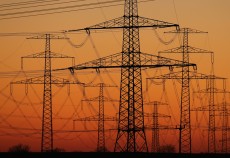By Aimen Eljali and Ahmed Elumami.
Tripoli, 8 December 2013:
There are . . .[restrict]hopes in Tripoli this evening that the continuing power outages in the capital will be over within the next 48 hours as a result of gas starting to flow again today from the Wafa field to the Ruwais power station near Nalut in the Jebel Nafusa.
Power generation in the country has been slashed to a record low in the past fortnight because of blockades on fuel supplies to power stations by Amazighs and Tebus in pursuit of political demands. Ten days ago, Electricity Minister Ali Muhairiq said it was just 4,600 megawatts (MW). Four days ago, however, the Amazigh announced an end to their action.
Gas started to arrive today at the power station, control room supervisor Othman Lambash told the Libya Herald, but at half the pressure needed to power the turbines. Lambash said that urgent work was being carried out at the Wafa field to increase the pressure and that it was hoped that supplies would be flowing again normally within 24 to 48 hours.
He explained that the plant has been operating just one of its five turbines since the blockade began. With the gas-powered station capable, when necessary, to run on oil, the single turbine has been powered by diesel. But the fuel consumption had been voracious, he said. Fifty trucks a day had been supplying 60,000 tonnes of diesel. Normally with 35,000 cubic metres of gas a day, each turbine could produce 150 MW of electricity, 750MW in all. Fuelled by diesel, the sole working one was producing just 125 MW.
Power outages have continued in the capital continued today to hit homes, shops and businesses alike, exacerbating public frustration with the government and Congress.
The worst hit areas have been Janzour in the far west of the city and Arrada (near Suq Al Juma) in the east. Residents of both report having had cuts totalling up to 12 hours a day. In Abu Sleem it has been as much as ten hours and in places such as Ghut Shaal, Zanata and Bab Ben Ghashir, outages totalling between four to six hours are reported. In the centre of Tripoli, they have been far less.
Power cuts in the east of the country are likely to continue, however. The Sarir power station is still closed as a result of Tebu protestors blockading fuel supplies. [/restrict]











